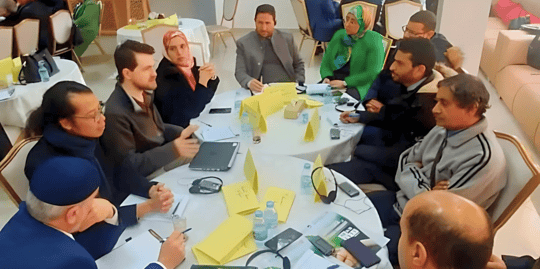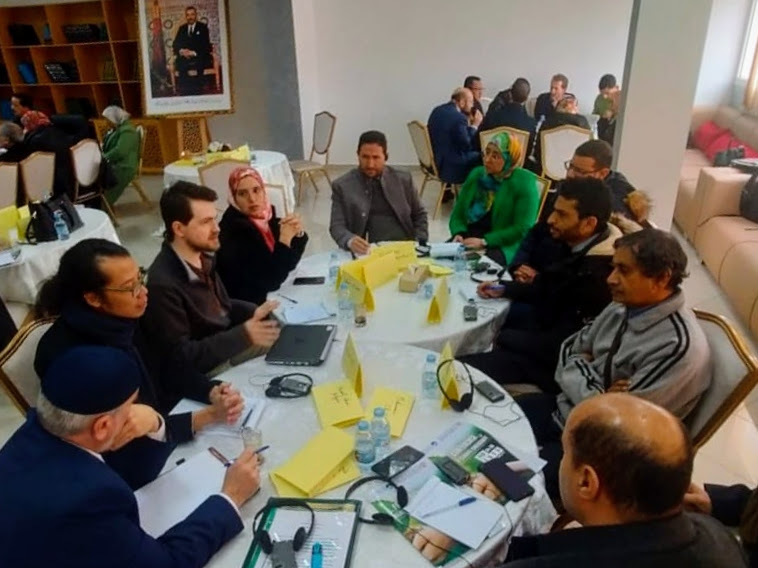The Final Declaration of The International Conference on Islam and Climate Emergency

In the name of Allah, Most Gracious, Most Merciful
February 24-26, 2023
Fes, Kingdom of Morocco
The following statement was issued during the International Conference on Islam and Climate Emergency, which was organized by the High Atlas Foundation (HAF) in partnership with the Faculty of Sharia at Sidi Mohamed Ben Abdellah University, Leave it in the Ground Initiative (LINGO), Germanwatch and GreenFaith. The event brought together climate experts and Islamic scholars on a discussion with the aim of consolidating pathways to achieving climate justice from an Islamic perspective.
Representatives and members of Islamic communities and people of other faiths, alongside experts in climate change science and policy, from ten countries, gathered in the historic city of Fes on February 24-26, 2023 for a Conference on Islam and Climate Emergency.
The conference was hosted by the Faculty of Sharia [Islamic law] at University Sidi Mohamed Ben Abdellah in Fes, which is known as the Kingdom’s spiritual capital for its harboring of different faiths. Morocco, an African and Arab Islamic country, is recognized for its commitment to its pluralist religious and multiethnic identity, as well as for tackling climate change by being a leader in renewable energies, under the leadership of His Majesty King Mohamed VI.
Following a thorough discussion that took into consideration Islamic Jurisprudence and the scientific study of the issues under discussion, the participants made the following conclusions and recommendations.
Conclusions:
- Humanity is in an unprecedented climate emergency.
- The balance in the atmosphere, which existed since the dawn of human civilization of two hundred and eighty parts of carbon dioxide per million, has been disrupted by an increase of half of this amount to four hundred and twenty parts per million.
- Human interference has already resulted in the warming of the world by 1.1° Celsius relative to pre-industrial temperatures, whereas 1.5° Celsius is the limit agreed by all nations in 2015, to lessen the probability of crossing dangerous tipping points toward uncontrollable climate disruption.
- Present warming has already resulted in clear loss and damage all around the world from climate catastrophes, including human death, loss of property and livelihoods, and mass extinction of many other species of life.
- Impacts of climate change, such as drought, heatwaves, storms and floods, are being felt severely in regions of North, West, and East Africa, Western, Southern, and Southeastern Asia, which are also historic homelands for much of the world’s Muslim communities, who do not bear historic responsibility for this climate change.
- The vast majority of human greenhouse gas emissions originate from the extraction and burning of fossil fuels, namely coal, oil, and gas. Whereas fossil fuels have provided appreciable benefits, their use currently presents, overall, an extraordinary risk to humanity, and their use should be phased down and phased out on the basis of equity, just transition, and support to the vulnerable from the historically responsible developed countries.
- Islam considers human beings’ relationship with the environment to be that of Caretaker [Khalifa] on Earth based on the consideration that it is a Sacred Trust [Amana] that must be kept, and within this we are responsible and accountable for our actions. Thus, we have agency while being within a Divine Framework.
- With respect to the relationships of human beings with our human siblings, our society and our environment, these are strongly contextualized within the Islamic doctrine and are framed by legal texts that call for the necessity of mutual cooperation [al-ta’awun al-mushtarak] in order to preserve and repair the environment. On this, Allah said: “Cooperate in righteousness and piety”, and “do no corruption [pollution] on the earth after it has been set in order”. َAlso, Prophet Muhammad [the Blessings of God and Peace upon him] said: “Show mercy to those on Earth and the One in the Heavens will show mercy to you.”
The combination of the three meanings (mercy, cooperation and repair) outlined in the abovementioned texts helps to tackle climate issues on the one hand, and encourages the implementation of relevant projects on the other hand.
- With respect to Almizan, Islam considers balance and moderation to be general principles and particular characteristics of Islamic law, and people are partners in the three: water, feeding, and fire. Therefore, it is necessary to work on preserving Balance as it is an Original State of existence and innate to Creation.
- The conference’s members agree to strive to deepen the understanding of Islamic perspectives on the environment and climate, to raise awareness within Muslim communities around the globe, and to promote sustainable practices and behavior. To this end, we suggested the launch of the Initiative on Islam and Climate Action during the International Conference on Islam and Climate Emergency, held on 24-26 February, 2023. The initiative’s mission statement includes a set of tasks as outlined in the following recommendations.
- The Initiative is a partnership of international and national organizations, academic institutions, and existing initiatives. Relevant researchers, associations, and foundations are welcome to join the initiative. The secretariat of the Initiative will lie within the High Atlas Foundation, who will be responsible for providing the convening space (e.g. annual conference, frequent network calls), supporting the individual partners where needed, and ensuring coherence and collaboration between all partners.
Recommendations:
- Call for rapid transformations of economies toward renewable energies so as to eliminate humanity’s interference with the climate system.
- With regard to the aim to reduce greenhouse gas emissions, Islam considers the necessity of adopting two main components.
- The first element is mediation and moderation in using the Earth’s resources by giving priority to necessities over luxuries, in accordance with the higher purposes of Islamic law [Maqasid al-sharia al-Islamiya].
- The second is accountability and accounting based on the principle that all humans are shepherds and humanity is responsible for the divine parish [ra’ya].
- Call for new research based on the Quran, Hadith, and jurisprudence in cooperation with climate and environmental scientists and thereby generating environmental and Islamic discernment. For this purpose, the Initiative will leverage collective expertise and resources.
- Disseminate the scientific studies through journals, magazines, education, publications, and books focused on the intersection of climate and related fields. This information material shall be publicly available.
- Collect the rulings on protection and preservation of the environment, and call upon all competent authorities in Fatwa [advisory opinions] and legislation to observe the necessity of paying attention to climate emergency in all its manifestations and causes, and to issue Fiqh-based Fatwa [Islamic jurisprudence] and legislation with the purpose of curbing the threat of the climate emergency on humanity.
- It is also necessary to benefit from the legacy of Islamic jurisprudence which is concerned with provisions on the environment, water, agriculture, and environmental and other catastrophes, which are based on the consideration of the higher purposes of Islamic law [Maqasid al-sharia al-Islamiya].
- Conduct training and education activities as well as awareness campaigns targeted towards university students, women and youth, Imams, and members of public and private institutions to increase knowledge, capacities, and promote sustainable practices.
- Convene events, conferences, and colloquia on climate and environmental issues from the Islamic perspective to strengthen partnerships between the individual organizations, to discuss relevant research questions, develop and implement solutions.
- The Faculty of Sharia of the Sidi Mohamed Ben Abdellah University seeks to establish an Islamic Observatory on Environmental and Climate Jurisprudence to explore the interconnection between Islam and the Climate Emergency.
The students of the Faculty will establish a student club on Islam and the Environment.

Islamic scholars and climate scientists and advocates taking part in group discussions during the third day of the International Conference on Islam and Climate Emergency at the Faculty of Sharia, Fes, Morocco. February 2023.
Photo: Abdelghani Kastih/HAF